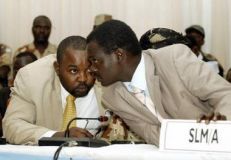Darfur rebels, Sudan govt prepare to re-enter peace talks
May 1, 2006 (ABUJA) — Darfur rebels and the Sudanese government prepared to re-enter talks and try to hammer out a deal by a new Tuesday deadline, as the rebels reaffirmed that they want changes to a draft peace proposal, and the government repeated its readiness to sign.
 African Union mediators who wrote the draft agreement had originally demanded the two sides sign by Sunday. They extended the talks by 48 hours under pressure from the U.S. after the rebels rejected the draft late Sunday.
African Union mediators who wrote the draft agreement had originally demanded the two sides sign by Sunday. They extended the talks by 48 hours under pressure from the U.S. after the rebels rejected the draft late Sunday.
Sudan’s government and the Darfur rebels have stretched peace talks out over more than two years without a treaty. Fighting and resulting hunger and disease over the last three years has killed tens of thousands of people. Millions have been forced from their homes and the conflict has increasingly drawn the world’s attention.
In Washington over the weekend, actors, athletes, politicians and religious leaders rallied to call attention to the Darfur conflict and urge greater U.S. involvement in ending what the United Nations has called one of the world’s worst humanitarian disasters.
The draft for peace proposed by the African Union last week was supported by the U.N., European Union, Arab League, U.S. and Canada, Salim Ahmed Salim, the lead AU mediator, said in a statement Sunday.
“We are not ready to sign until the Sudanese give concessions to our demands,” Hahmed Hussein, a spokesman for one of two rebel factions, said Monday. In rejecting the AU draft, he said he was speaking on behalf of both his Justice and Equality Movement and the other main rebel group, the Sudan Liberation Movement.
The rebels, who went to war complaining that their impoverished region had been neglected by the national government, say the AU draft pact fails to meet their demands for autonomy or for what they see as adequate representation in the central government.
Mr. Salim said his team tried to strike a compromise on autonomy, creating a transitional authority for the region that would include rebel representatives and proposing that the people of Darfur vote by 2010 on whether to create a single geographical entity out of the three current Darfur states. A unified Darfur would presumably have more political weight, and the rebels had demanded one be created by presidential decree.
The rebels had also demanded a third vice president, from Darfur, be added to the national government. The compromise draft called for the president to include a Darfur official, initially nominated by the rebels, among his top advisers.
Mr. Salim said the expert would have “all the attributes of a vice president, except the name,” and noted Sudan’s constitution, drafted under a treaty that ended an unrelated, 21-year north-south Sudan war last January, permitted only two vice presidents.
In accepting the draft, the government agreed to disarm militia it is accused of unleashing on Darfur civilians, commit millions of dollars to rebuilding a region devastated by poverty and war, and compensate victims of the fighting, Mr. Salim said.
Sudan has indicated it might accept a U.N. peacekeeping force in Darfur, where now only a beleaguered AU peacekeeping force is operating.
“I welcome the acceptance by the government of the proposed Darfur peace agreement,” Mr. Salim said. “However, I would also like to remind the government that leadership and the responsibility of a state does not end there. By definition, government has a larger responsibility and must act at all times with extra generosity.”
Mr. Salim took a firm tone with the rebels, saying dealing with them had been frustrating. Rivalries within the rebel groups had made negotiations difficult, and they and the government repeatedly violated a cease-fire.
“I can tell you without any hesitation that this war in Darfur has shaken Africa to its core and has galvanized sympathy among ordinary people throughout the world,” Mr. Salim said in the statement released moments before the original Sunday deadline for agreement passed. “The eyes of Africa and the wider international community are fixed on us here.”
An agreement between Sudan and the rebels likely would be seen as a triumph of African diplomacy. The talks have been organized by the 53-nation African Union, with key participation from leaders from South Africa and Nigeria.
Decades of low-level tribal clashes over land and water in Darfur erupted into large-scale violence in early 2003 when the rebels took up arms. The central government is accused of responding by unleashing Arab tribal militias known as Janjaweed to murder and rape civilians and lay waste to villages. Sudan denies backing the Janjaweed.
Darfur’s violence recently spilled into neighboring Chad and threatens to escalate: Osama bin Laden last week urged his followers to go to Sudan to fight a proposed U.N. presence.
Amid the negotiations, the plight of three million refugees in Darfur has worsened. The U.N. World Food Program said Friday that it was cutting rations in half, citing a lack of funds.
(ST/AP)
